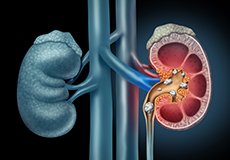Kidney Stone Disease
-
Extracorporeal Shockwave Lithotripsy
Kidney stones are small, hard deposits that can develop in the kidneys. Lithotripsy, often referred to as extracorporeal shock wave lithotripsy (ESWL), is the most common procedure for the management of kidney stones (renal lithiasis). It uses shock waves to break up stones that form in the kidney, bladder or ureter, enabling easy passage of the fragments out of the body within the urine.
-
Kidney Stone Prevention
New patients in my clinic understand I have two goals: to treat their current stones and to then prevent stones in the future. The less they have to see me the better. Since prevention is key, I wanted to share my stone top 4 stone prevention tips and tricks.
-
Kidney Stones – What are They?
As the kidneys filter the blood of impurities, minerals and acid salts can accumulate and harden over time. These solid crystalline deposits are called kidney stones and can form in one or both kidneys. The stones can travel down the urinary tract and block the flow of urine, causing severe pain and bleeding.
-
Ureteroscopy with Laser Lithotripsy
Ureteroscopy is a procedure that involves the use of a thin, long tube called a ureteroscope, to examine, diagnose and treat urinary tract problems. The ureteroscope is most commonly used for the diagnosis and treatment of kidney stones but is also indicated for the treatment of various conditions such as frequent urinary tract infections, urinary blockage, hematuria (blood in the urine), unusual cell growth or tumor in the ureters (urine tubes).
-
Types of Kidney Stones
Different types of kidney stones, while small in size, can cause considerable discomfort and pain. These hard mineral deposits form within the kidneys and can vary in composition, leading to different types of kidney stones. Understanding the distinctions among these types is essential for effective prevention, management, and treatment.








